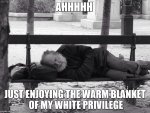Crispy
Active member
- Joined
- Jul 5, 2005
- Messages
- 332
- Reaction score
- 26
- Gender
- Undisclosed
- Political Leaning
- Undisclosed
I'm writing this post admitting my prior ignorance of the large body of work on "White Privilege" in the Social Sciences. After some research and meditation on the topic I decided to put forward some questions that I hope would spur better discussions about this. Let me start by saying I'm still a skeptic of the validity of pursuing white privilege as a social science inquiry over other inquiries that are more targeted in their inquiry and more specific in their intended result.
Admittedly I now recognize the validity though in asking "what benefits do whites have?" vs "what disadvantages do non-whites, particularly blacks endure?"
That said i first wish to confirm my understanding of "white privilege" by attempting to define it in short:
White privilege is the benefit that whites have in society today because of a cultural trajectory of privilege that's been defined by the superior place in society that whites have occupied over other groups. Meaning that since whites have been the dominant group in the cultural evolution of society, privileges have been shaped based on what that dominant group's interests and goals have been over time. What this implies is that other groups have been subordinate to a culture shaped by one groups interests and ideals, and which naturally follows that that one group remains the dominant group insofar as the other groups aspire towards acquiring "privileges" defined by the main group. This also implies that whites will ultimately have an easier time pursuing and benefiting from those privileges since they inherit the interests, successes and benefits of their group from birth.
So first I ask if this adequately summarizes white privilege? If so, and I think this is an adequate, if not overly simplistic definition, then let me pose these questions:
Is America in fact shaped by the interests of whites alone or can a case be made that it's been shaped equally by blacks or other groups?
Do the statistics that we use to demonstrate white privilege adequately represent proof of the white privilege hypothesis?
Are the privileges afforded to whites universal? (in part referring to the argument that privileges and rights are separate)
Does white privilege encompass too broad and multi faceted an inquiry that omits more complex societal relationships that could yield more precise results and prescriptions for actions going forward?
Ok, have at it? Kick my ass...
Admittedly I now recognize the validity though in asking "what benefits do whites have?" vs "what disadvantages do non-whites, particularly blacks endure?"
That said i first wish to confirm my understanding of "white privilege" by attempting to define it in short:
White privilege is the benefit that whites have in society today because of a cultural trajectory of privilege that's been defined by the superior place in society that whites have occupied over other groups. Meaning that since whites have been the dominant group in the cultural evolution of society, privileges have been shaped based on what that dominant group's interests and goals have been over time. What this implies is that other groups have been subordinate to a culture shaped by one groups interests and ideals, and which naturally follows that that one group remains the dominant group insofar as the other groups aspire towards acquiring "privileges" defined by the main group. This also implies that whites will ultimately have an easier time pursuing and benefiting from those privileges since they inherit the interests, successes and benefits of their group from birth.
So first I ask if this adequately summarizes white privilege? If so, and I think this is an adequate, if not overly simplistic definition, then let me pose these questions:
Is America in fact shaped by the interests of whites alone or can a case be made that it's been shaped equally by blacks or other groups?
Do the statistics that we use to demonstrate white privilege adequately represent proof of the white privilege hypothesis?
Are the privileges afforded to whites universal? (in part referring to the argument that privileges and rights are separate)
Does white privilege encompass too broad and multi faceted an inquiry that omits more complex societal relationships that could yield more precise results and prescriptions for actions going forward?
Ok, have at it? Kick my ass...


